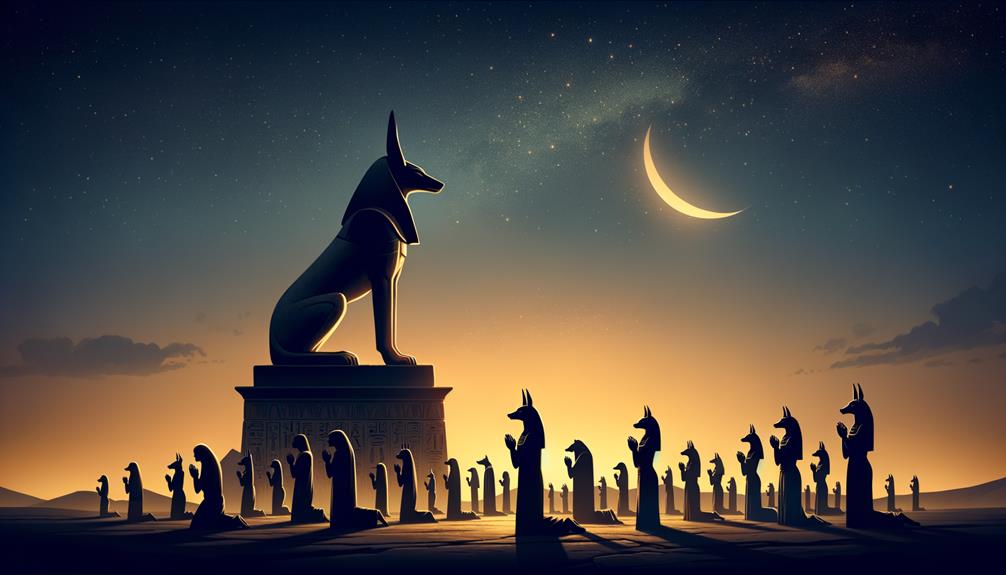I've been diving into the world of ancient Egyptian gods for years, and Anubis, the god of the dead and the underworld, has always had a special allure. His story, his origins, and his ongoing relevance are truly captivating. We get a peek into the mindset, rituals, and societal systems of a civilization long gone when we examine Anubis through ancient texts and artifacts.
Looking at his connection with other gods such as Osiris, his composite deity Hermanubis, and the symbols that represent him, helps us get a clearer picture of how the ancients saw the universe. But Anubis remains a puzzle, intriguing and complex, always inviting us to dig deeper into his narrative and his place in ancient and modern worship.
You see, Anubis isn't just a god from the past. His story continues to be relevant today as people still find meaning and connection in his tale. So, let's keep learning about him together, shall we? And remember, not all answers are straightforward, but that's part of the charm when studying deities like Anubis!
Understanding Anubis' Role

Let's delve into the intriguing world of ancient Egyptian culture and explore the pivotal role of Anubis, a deity who held a profound connection with the dead and funerary customs. Anubis, often hailed as the Lord of the Sacred and the Master of Secrets, is a key character in Egyptian mythology. As the god of mummification, his duties in preserving and caring for the deceased were highly valued.
Anubis' role was substantial, not just symbolically, but also in a very hands-on way. During the Early Dynastic period and the Old Kingdom, Anubis stood tall as a protector and advocate for the dead. His job description even extended to the creation of embalming, a vital step in readying bodies for their journey to the afterlife.
The significance of Anubis' role becomes even more profound when we look at his duties in the afterlife. As Anubis, he took on the daunting job of weighing the souls of the departed, which underscores his authority and importance in the spiritual world.
Peeling back the layers of Anubis worship provides us with a clear picture of the crucial role he occupied in ancient Egyptian society. Anubis was more than just a god; he was a central part of their perception of life, death, and what comes next.
Origins of Anubis Worship
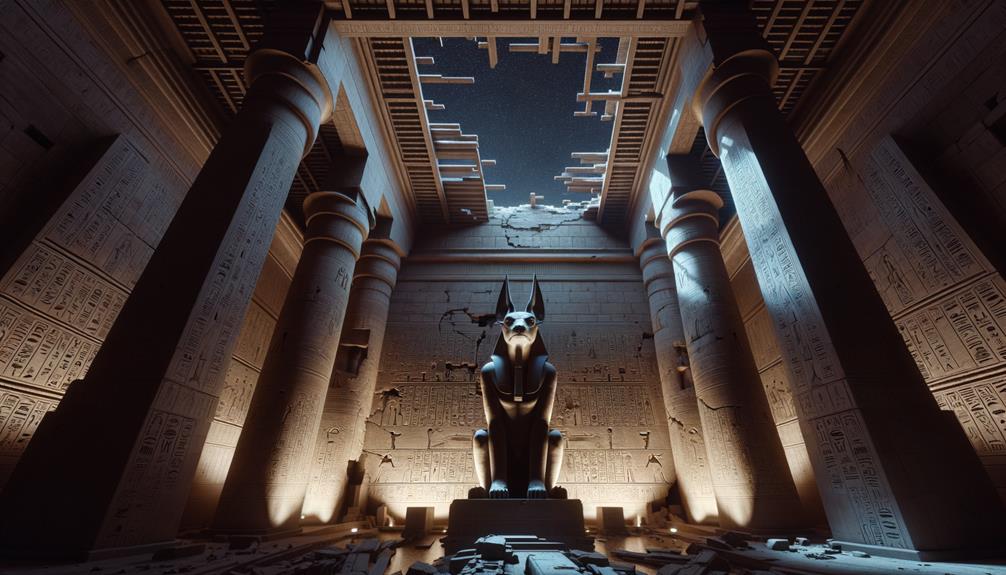
Let's chat about the origins of Anubis worship. Anubis, the ancient Egyptian god of the dead, is often portrayed as a jackal or a man with a jackal's head. This deity played a crucial role in Egyptian society during the Early Dynastic period and the Old Kingdom. Ancient Egyptians, who referred to him as Anpu, have worshipped him since Predynastic times. This makes him one of the earliest, if not the very first, Egyptian deity.
Anubis, also known as the jackal-headed god, has a deep-seated connection with death and the afterlife in Egyptian culture. There are several symbols associated with Anubis, such as:
- The jackal, which represents his role as the guardian of graves and the guide of souls.
- The embalming process, underscoring his status as the original embalmer.
- The journey to the afterlife, a trip where Anubis is often seen as the guide leading souls to their final resting place.
Our knowledge about Anubis doesn't just revolve around the god himself. It also provides us with a glimpse into the beliefs and ideologies of a society that flourished more than 8000 years ago.
Significance in Ancient Society
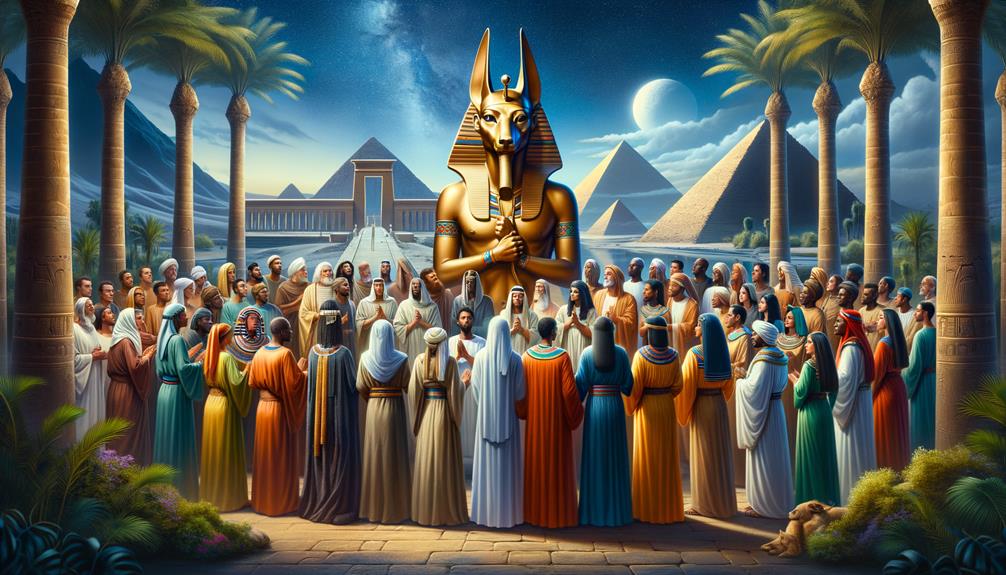
Let's delve into the fascinating world of Anubis, an essential figure in ancient society. The importance of Anubis in the lives of the ancient Egyptians is truly profound. As revealed in my study on Anubis worship, this death god played a pivotal role in their religious and societal customs.
Anubis was intimately tied to the rituals of mummification and funeral ceremonies, representing the Egyptians' beliefs about mortality and life after death. The Book of the Dead, a cornerstone of Egyptian civilization, often mentions Anubis, reflecting his central role. He was revered not only as a god of death but also as a guide for souls in the afterlife.
Anubis has left a significant mark on the cultural landscape, evident in the use of Anubis masks in funeral rituals and in the formation of the hybrid deity, Hermanubis. The ancient Egyptians' admiration of Anubis mirrors the high importance they placed on death and the afterlife. Therefore, Anubis is among the most influential Egyptian gods, speaking volumes about the vibrant spiritual life of this exceptional civilization.
Anubis in Mythology
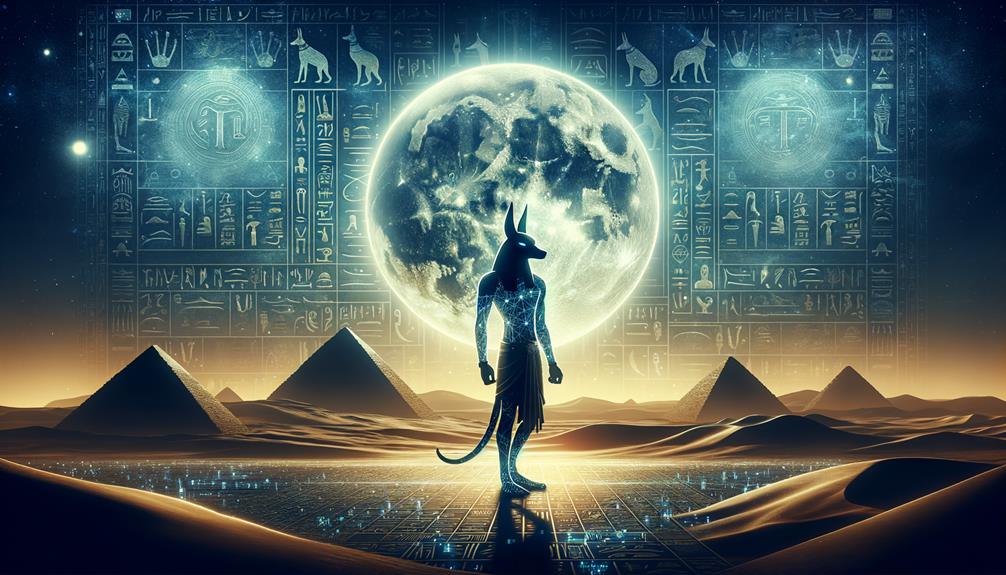
Unraveling the rich and intricate tales of mythology, Anubis stands out. Usually portrayed as a man with a jackal's head or simply as a jackal, he symbolizes control over death and what comes after. Anubis is known as the God of the Dead, holding a position of great importance among the ancient Egyptian gods.
My study of Anubis worship has given me a deeper insight into this deity. Anubis is arguably one of the most recognizable gods from ancient Egypt, often linked with rituals of death. There are several aspects of Anubis that are frequently represented:
- Anubis as the originator of embalming, reinforcing his command over the preservation of the dead.
- Anubis is occasionally shown alongside Hermes, the Greek god who guided souls to the afterlife, suggesting an exchange of ideas among ancient societies.
- Being the son of Ra, further emphasizes Anubis's standing among the gods.
The connection between Osiris and Anubis adds another layer of complexity to ancient Egyptian mythology, demonstrating a detailed and intricate web of divine roles and duties.
Modern Interpretations of Anubis
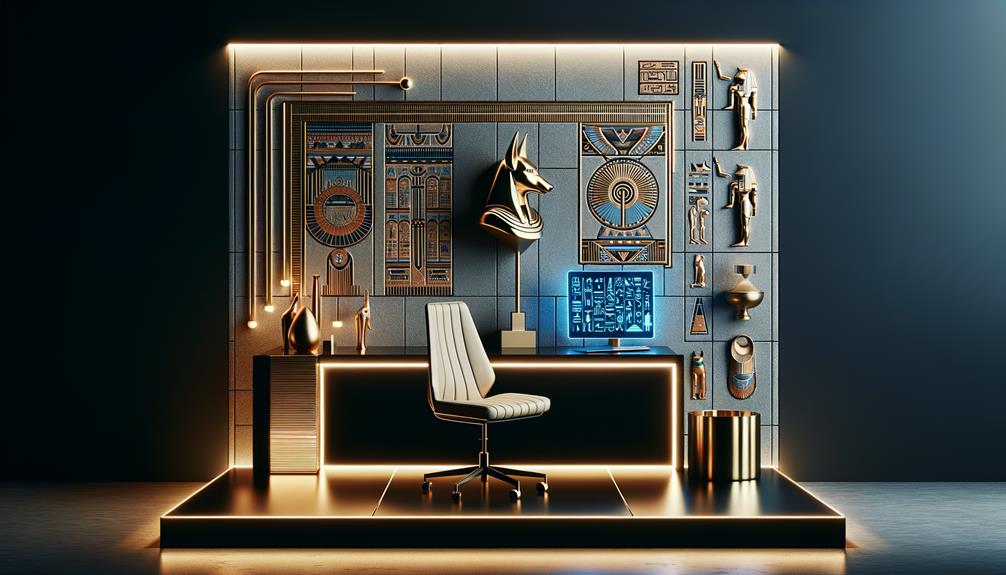
Today's views of Anubis have certainly evolved, but they still carry forward his ancient duties as the overseer of the dead and the adjudicator of hearts in the afterlife. Our up-to-date research into Anubis worship shows that he's still depicted as a man with a black dog's head, and people turn to him for safety, direction, and for unravelling the secrets of the cosmos.
In these new-age interpretations, Anubis comes across as a kind deity who values sincere offerings over grandiose gestures. This is a clear departure from the older portrayals of him as the serious child of Osiris and Isis, tasked with guiding the souls of the deceased through the hall of truth.
Nowadays, he's also seen as the protector of those who are lost or alone, which is quite a fitting progression for the divine figure who used to escort souls to the Divine Booth. His emblem, the renowned dog's head, remains a potent symbol, encapsulating the equilibrium between the earthly realm and the afterlife, a fundamental tenet in the contemporary recognition and veneration of Anubis.
Frequently Asked Questions
How Is Anubis Worshipped?
As I dug into the topic, it became clear that people express their devotion to Anubis in quite a few interesting ways. Engaging in prayer rituals, making offerings, and even incorporating modern twists on traditional Egyptian burial customs are all part of the mix. It's also worth noting that Anubis holds a special place in the hearts of many as a trusted guide and guardian when it comes to matters of life and death.
What Is the Theology of Anubis?
So, we're trying to figure out the theology of Anubis, right? Well, let's dive in. It revolves around some pretty big themes – think death and the afterlife. Anubis is the one who guides souls, checks out their hearts against Ma'at's feather of truth, and even has a hand in mummification. He's a pretty big deal in the world of ancient Egyptian beliefs.
Who Is Anubis in the Bible?
You might be wondering, "Is Anubis mentioned in the Bible?" Well, the simple answer is no. Anubis, known as an ancient Egyptian god linked with the practices of mummification and notions of life after death, doesn't appear in the Bible. His role in Egyptian spiritual beliefs doesn't really align with the stories and teachings found in the Bible, which explains why he's not a character in any biblical tales.
Is It Good to Keep Anubis at Home?
Well, that really depends on your personal preferences. Are you a fan of ancient Egyptian culture or mythology? If so, you might find it fascinating to have an Anubis statue in your home. But, just to set the record straight, it's not going to have any special powers or bring you good fortune.

